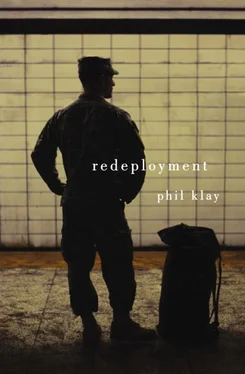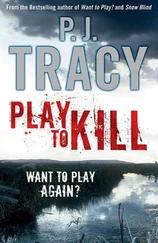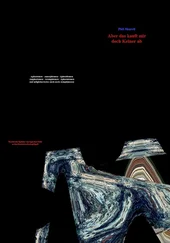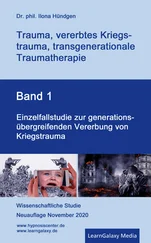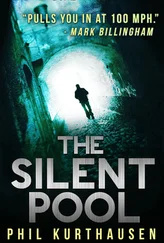The trainer, a captain, was stunned. You can’t contradict an O5, especially not in front of his men, so he didn’t say anything, but the whole unit had just been taught to ignore MEF policy. The Marines got the message. Kill.
• • •
In the end,I went to Major Eklund. I figured he’d at least hear me out.
“I’m worried about Charlie Company.”
“Yeah, we’re all worried about Charlie Company.” Major Eklund shrugged. “They’re led by an idiot. What are you gonna do?”
I gave him a condensed, anonymous version of Rodriguez’s story about doing naked jumping jacks to attract fire.
Major Eklund laughed. “That sounds like a lance corporal solution.”
“You think this is funny.”
“I’ll bring it up with Captain Boden.”
That hardly satisfied me. “The Marines don’t seem to see much difference between civilians and combatants. Some Marines have been hinting at worse than stupid tactics.”
Eklund sighed.
“Perhaps,” I said, “some of their firefights could be looked into a little more. To make sure we’re targeting actual enemy.”
Eklund stiffened. “An investigation?” He shook his head. “Into what?”
“There are some questionable—”
“Only the commander can recommend an investigation.” He shook his head. “And Chaps, all respect, but this is way the fuck out of your purview.”
“Marines talk to me,” I said, “and—”
“This is nothing,” he said. “Last month Weapons Company shot two hajjis I know they didn’t follow ROE on. And Colonel Fehr didn’t think that was worth an investigation. You know what he told me? ‘I don’t want my Marines thinking I don’t have their backs. And I really don’t want them hesitating to shoot when they need to.’ And that was the end of the story, Chaps.”
He hadn’t even paused to consider what I was suggesting. “You’re saying this is weaker than that.”
“Weak, strong, it doesn’t matter,” he said. “You think Lieutenant Colonel Fehr will ever become Colonel Fehr if he tells higher, ‘Hey, we think we did some war crimes’?”
It wasn’t a question I wanted to answer. Eventually, looking at my feet, feeling childish, I said, “I suppose not.”
“And he’s the one who decides if there’s something worth investigating. Look, you know how I feel about that man, but he’s handling Charlie Company about as well as anybody could. They came to Iraq to kill people, so he gave them the kill people AO. And he’s been shrinking their AO as Bravo gets better control of theirs.”
What he was saying didn’t really register. “Bravo?” I said.
“They’re getting more responsibility while Charlie’s getting less. And at the end of the deployment, Captain Boden will get a FITREP that makes sure he’s never given a command again. Happy?”
He could see I wasn’t.
“Look, Father,” Eklund said. “In a war like this, there’s no easy answer. Neighborhood gets roughed up, sometimes. Sometimes, by accident, there’s civilian casualties. It’s not our fault.”
That was too much. “No?” I said. “It’s never our fault?”
He leaned toward me and pointed his finger in my face. “Look, Chaps, you have no idea what these guys are dealing with. On my last deployment I saw a couple insurgents literally hiding behind a group of Iraqi children and shooting at us. Do you know how hard it is to get shot at and not respond? And that’s what my Marines did. They let themselves get shot at because they didn’t want to risk hurting children.”
“That’s not what’s happening now.”
“Most Marines are good kids. Really good kids. But it’s like they say, this is a morally bruising battlefield. My first deployment, some of those same Marines fired on a vehicle coming too fast at a TCP. They killed a family, but they followed EOF perfectly. The driver was drunk or crazy or whatever and kept coming, even after the warning shots. They fired on the car to save the lives of their fellow Marines. Which is noble, even if you then find out you didn’t kill al-Qaeda—you killed a nine-year-old girl and her parents instead.”
“Well,” I said, “if Bravo’s doing okay, and Charlie’s—”
“Bravo’s got good leaders and a calmer AO,” he said. “They trained their Marines right. Captain Seiris is good. First Sergeant Nolan’s a rock star. Their company gunny is retarded, but all of their lieutenants are good to go except maybe one, and he’s got a stellar platoon sergeant. But not everybody can be competent. It’s too late for Charlie to be anything other than what it is. Our Kill Company. But this is a war. A Kill Company’s not the worst thing to have.”
• • •
A few days laterI voiced my concerns, in somewhat stronger language, to the JAG. I got the same response. What Rodriguez told me didn’t warrant anything other than a discussion with the company commander, who would handle it as he thought appropriate. Nothing would happen. I felt I was letting Rodriguez down, but I had no power. And the war ground on.
Three weeks later we had our thirteenth casualty. Gerald Martin Vorencamp. IED. Two weeks after that, our fourteenth. Jean-Paul Sepion. Neither from Charlie Company, though they had a few more serious, nonfatal injuries during the same period.
• • •
Not long after Sepion’s death,one of the Divine Office’s morning prayers was Psalm 144: “Blessed be the Lord, my help, who trains my hands for battle, my fingers for war.” Kneeling against my rack in my spare little trailer, I faltered. I turned back to the previous prayer, from Daniel: “Today there is no prince, no prophet, no leader, no holocaust, no sacrifice. No offering, no incense, no first-fruits offered to you—no way to obtain your mercy.”
I stopped reading and tried to pray with my own words. I asked God to protect the battalion from further harm. I knew He would not. I asked Him to bring abuses to light. I knew He would not. I asked Him, finally, for grace.
When I turned back to the Divine Office, I read the words with empty disengagement.
• • •
That afternoon I met another Marinefrom Rodriguez’s platoon, a lance corporal. He did little to calm my worries.
“This is fucking pointless,” he told me.
The lance corporal wasn’t Catholic, nor was he in need of religious counseling. He came to me when Combat Stress refused to give him what he needed—a ticket out of Iraq. I couldn’t give it to him either, but I tried.
“What’s pointless?”
“This whole fucking thing. What are we doing? We go down a street, get IED’d, the next day go down the same street and they’ve IED’d it again. It’s like, just keep going till you all die.”
He stared at me without breaking eye contact. I thought of Captain Boden.
When I asked him why he felt the way he did, I got a long list. Since the deaths of two of his friends six weeks before, he’d been having mood swings, angry outbursts. He’d been punching walls, finding it impossible to sleep unless he quadrupled the maximum recommended dosage of sleeping pills, and when he did sleep he had nightmares about the deaths of his friends, about his own death, about violence. It was a pretty complete PTSD checklist—intense anxiety, sadness, shortness of breath, increased heart rate, and, most powerfully, an overwhelming feeling of utter helplessness.
“I know I won’t make it out of combat alive,” he said. “Every day, I have no choice. They send me to get myself killed. It’s fucking pointless.”
I tried to get him to talk about positive things, things that he liked, to determine if there was anything he was holding on to. Anything keeping him on the good side of sane.
Читать дальше
